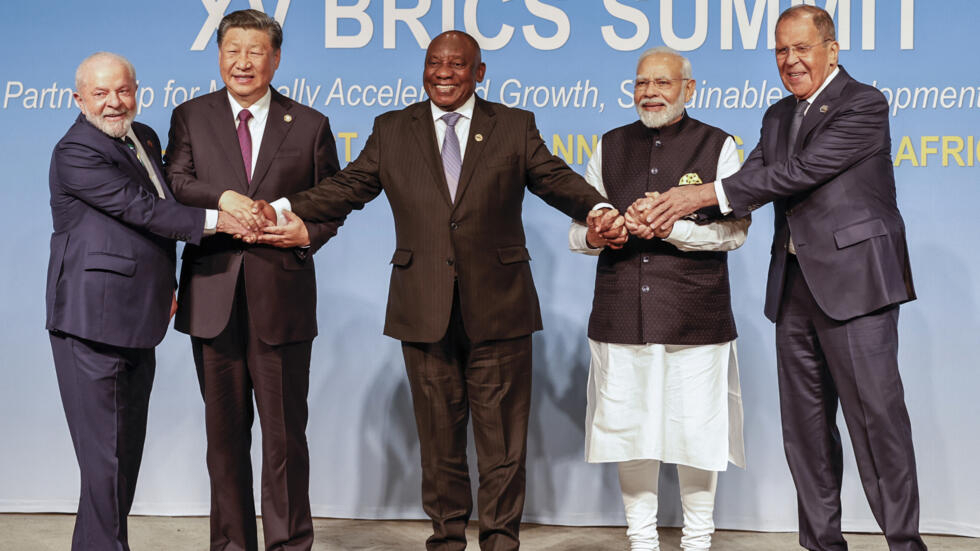BRICS is expanding beyond the starting countries, as on Thursday, it announced six new countries to join next year meeting.
The BRICS founding members, Brazil, Russia, Indian, China and South Africa have agreed to include Argentina, Ethiopia, Iran, Saudi Arabia, Egypt and the United Arab Emirates full members from January 1.
“This membership expansion is historic,” said Chinese President Xi Jinping, whose nation is the most powerful in the group of non-Western states that represents a quarter of the world’s economy.
“The expansion is also a new starting point for BRICS cooperation. It will bring new vigour to the BRICS cooperation mechanism and further strengthen the force for world peace and development”.
Ethiopian Prime Minister Abiy Ahmed hailed what he called “a great moment” for his country, the second-most populous in Africa.
“Ethiopia stands ready to cooperate with all for an inclusive and prosperous global order,” he said on X.
In Iran, senior presidential advisor Mohammad Jamshidi described the move as a “historic development and a strategic success” for Tehran’s foreign policy.
During its three-day summit in Johannesburg, discussions about expanding the BRICS group took centre stage and revealed disagreements among member countries regarding the speed and quantity of admitting new members.
Despite these differences, South African President Cyril Ramaphosa announced that the group, which operates on a consensus-based decision-making approach, had reached an agreement on the admission criteria. This development lays the foundation for potential future expansion of the bloc.
Nearly two dozen countries have formally applied to join, and about the same number have expressed interest from across the “Global South”, a broad term referring to non-Western nations.
Approximately 50 other heads of state and government were present at the summit, highlighting the allure of BRICS’ message and its growing significance on the global stage, as per BRICS leaders’ perspective.
US officials have downplayed the prospects of BRICS emerging as a geopolitical competitor, characterising the group as a diverse assemblage of countries that encompass both allies and rivals.
This coalition consists of a varied assortment of economies, ranging from large to small, encompassing democratic and authoritarian states. The aspirants seeking membership and those already admitted into the fold mirror this diversity.
Nevertheless, despite these disparities, BRICS leaders share a common conviction that the prevailing global framework is heavily dominated by Western nations and institutions that do not adequately address the needs of developing countries.
Brazilian President Luiz Inacio Lula da Silva, a vocal advocate of the BRICS development bank as an alternative to the Washington DC-based International Monetary Fund and World Bank, emphasized, “Our diversity strengthens the fight for a new international order.”
Lula noted that with the addition of six new members, the BRICS now represents nearly half of the world’s population and an even more substantial portion of its economic output.
Indian Prime Minister Narendra Modi expressed that his country maintains “deep” ties with the newly admitted members and anticipates that BRICS will introduce “new dimensions” to bilateral cooperation.
Originally founded in 2009 and expanded to include South Africa the following year, the bloc has risen to prominence amidst intense geopolitical rivalries. Analysts highlighted that its 15th summit in Johannesburg holds potential significance.
China has actively advocated for rapid BRICS expansion to counterbalance the G7 coalition of affluent democracies and other Western-led institutions, particularly in light of increasing competition with the United States.
South Africa and Russia also advocated for expansion. Russian leader Vladimir Putin, subject to an international arrest warrant, addressed the summit via video link.
The Johannesburg summit underscored divisions with Western nations regarding the conflict in Ukraine, highlighting the support Russia receives from its BRICS partners despite its global isolation.
South Africa, China, and India refrained from condemning Russia’s invasion, while Brazil declined to join Western nations in providing arms to Ukraine or imposing sanctions on Moscow.



